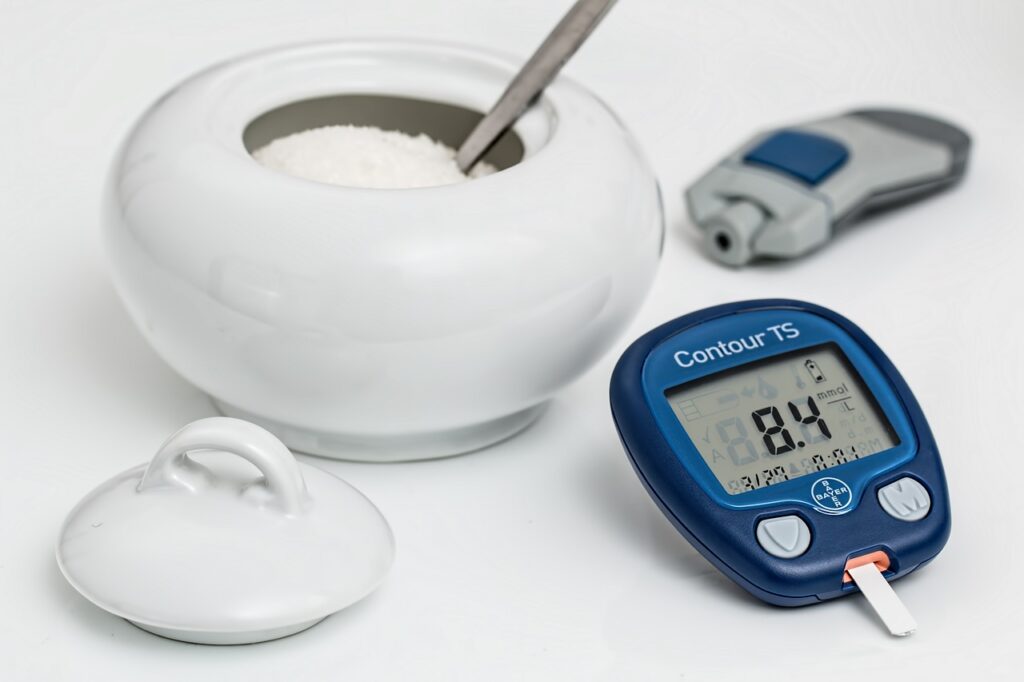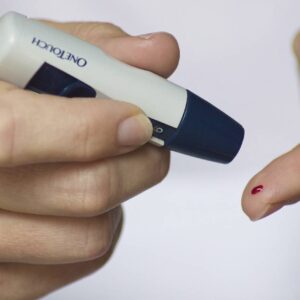Managing Diabetes in a Healthy, Balanced Way 3 Essential Tips
Managing diabetes in a healthy way is essential for preventing complications and maintaining a good quality of life.
A holistic approach that involves healthy eating, regular physical activity, medication use and regular blood glucose monitoring can help maintain diabetes control. Working together with a team of healthcare professionals is key to finding the best way to manage diabetes in an individualized and effective manner.Diabetes is a chronic disease that affects millions of people around the world. It is a disease in which the body is not able to produce or use insulin properly, which leads to an increase in blood glucose levels. Living with diabetes can be challenging, but with a healthy lifestyle and proper care, it is possible to control the disease and avoid serious complications.
The first thing to consider is diet. A balanced diet is the foundation of a healthy lifestyle for people with diabetes. Foods rich in fruits, vegetables, whole grains, and lean proteins should be the basis of the diet. It is important to avoid processed foods, sugars, and saturated fats. In addition, it is important to maintain regular meal times to avoid fluctuations in blood glucose. It is important to remember that every person with diabetes is unique and may need a different eating plan, so it is important to work with a nutritionist to create an eating plan that is tailored to your needs.
Regular physical activity
Is another important factor in living with diabetes. At least 30 minutes of physical activity a day, such as walking, jogging, swimming, or dancing, helps to keep blood glucose under control and improve overall health. It is important to remember that before starting any exercise program, it is necessary to consult a physician to verify that it is safe for your health.
Measuring your blood glucose regularly is important for monitoring your blood glucose and adjusting your medication if necessary. It is important to record the measurement results and share them with your doctor during regular appointments. In addition, it is important to take medications prescribed by your doctor, such as insulin or diabetes pills, strictly according to your doctor’s directions.
Regular visits to the doctor are another important part of living with diabetes. Your doctor can help you adjust your diet, medication, and physical activity plan to keep your diabetes under control. In addition, during your visits, you can monitor your overall health and have routine check-ups to see if there are any emerging health problems.
Does a balanced diet improve blood sugar levels?

A balanced diet is essential for diabetes control. A balanced diet includes a variety of foods from different food groups, such as fruits, vegetables, whole grains, lean proteins, and healthy fats. It is important to limit consumption of sugars, saturated fats, and processed foods.
Fruits and vegetables are an excellent source of nutrients, including vitamins, minerals, and fiber. They are also low in calories and fat, which is important for keeping weight under control. In addition, fruits and vegetables are rich in antioxidants, which help protect the body against cell damage.
Whole grains, such as whole grain bread, brown rice, and whole grain pasta, are a good source of fiber, which helps keep blood sugar stable. In addition, they provide energy more slowly than refined grains, which can help prevent fluctuations in blood sugar.
Lean proteins, such as chicken, fish, beans, and nuts, are a good source of important nutrients, such as iron and zinc. They also help to keep blood sugar stable and to build and maintain healthy muscles.
Healthy fats, such as those found in fatty fish, avocados, and nuts, are important for overall health, including heart health. They help maintain satiety and prevent overeating, which can help control weight.
When planning balanced meals, it is important to remember that each person with diabetes is unique and may need a different eating plan. It is important to work with a dietician to create an eating plan that is tailored to your needs, including your dietary restrictions, physical activity levels, and health goals. With a balanced diet, you can keep your diabetes under control and enjoy a healthy and active life.
A balanced diet is key to diabetes control. A balanced diet includes a variety of foods from different food groups, such as fruits, vegetables, whole grains, lean proteins, and healthy fats. It is important to limit consumption of sugars, saturated fats, and processed foods.
Fruits and vegetables are an excellent source of nutrients, including vitamins, minerals, and fiber. They are also low in calories and fat, which is important for keeping weight under control. In addition, fruits and vegetables are rich in antioxidants, which help protect the body against cell damage.
Does regular physical activity help control diabetes?
Regular physical activity is an important part of managing diabetes. It helps regulate blood sugar levels, improves insulin sensitivity, and helps keep weight under control. In addition, regular physical activity can help improve heart health, increase muscle strength, and increase flexibility.
Physical activity can be any type of movement, from walking to running, swimming, or dancing. The important thing is to find an activity that you enjoy and can do regularly. It is important to consult your doctor before starting any exercise program, especially if you have additional health problems.
The general recommendation is at least 150 minutes per week of moderate aerobic activity or 75 minutes per week of vigorous aerobic activity. In addition, it is important to include muscle-strengthening exercises twice a week.
Physical activity can also affect blood sugar levels, especially if it is performed in conjunction with a balanced diet. It is important to monitor glucose levels before, during, and after exercise, and to adjust insulin doses or medications if necessary.
Overall, regular physical activity is a key part of diabetes management and can help improve overall health. It is important to work with your doctor to create a physical activity plan that is tailored to your health needs and goals. By incorporating physical activity into your daily routine, you can enjoy a healthy and active life with diabetes under control.
Whole grains, such as whole grain bread, brown rice, and whole grain pasta, are a good source of fiber, which helps keep blood sugar stable. In addition, they provide energy more slowly than refined grains, which can help prevent fluctuations in blood sugar.
Lean proteins, such as chicken, fish, beans, and nuts, are a good source of important nutrients, such as iron and zinc. They also help to keep blood sugar stable and to build and maintain healthy muscles.
Healthy fats, such as those found in fatty fish, avocados, and nuts, are important for overall health, including heart health. They help maintain satiety and prevent overeating, which can help control weight.
When planning balanced meals, it is important to remember that each person with diabetes is unique and may need a different eating plan. It is important to work with a dietician to create an eating plan that is tailored to your needs, including your dietary restrictions, physical activity levels, and health goals. With a balanced diet, it is possible to keep diabetes under control and enjoy a healthy and active life.
7 Steps to Effective Diabetes Control and Healthier Living
Fruit and vegetable based food supplement
Diabetes is a chronic disease that affects millions of people worldwide. It is characterized by rising blood sugar levels, which can lead to serious health problems such as heart disease, kidney damage, neuropathy, and even blindness. However, there are several ways to manage and control diabetes, including dietary changes, exercise, and in some cases dietary supplements. One such supplement is Glucoberry, which has been promoted as a natural option to help control diabetes. But what is Glucoberry, and what are its health benefits?
Glucoberry is a fruit and vegetable-based dietary supplement that contains ingredients known to help control blood sugar levels, including blueberry, raspberry, blackberry, cherry, pomegranate, grape, carrot, pumpkin, spinach, and kale. These ingredients contain antioxidants, vitamins, minerals, and other compounds that can help improve overall health and well-being.
One of the main benefits of Glucoberry is that it can help control blood sugar levels. This is because the ingredients in Glucoberry contain compounds that can help increase sensitivity to insulin, a hormone that helps regulate blood sugar levels. In addition, Glucoberry can also help prevent insulin resistance, which is one of the main causes of type 2 diabetes.
Another benefit of Glucoberry is that it can help reduce inflammation in the body. Chronic inflammation is a risk factor for many diseases, including diabetes, and can lead to tissue and organ damage in the body. However, the antioxidants and anti-inflammatory compounds found in Glucoberry can help reduce inflammation and protect the body from damage.
In addition, Glucoberry may help improve cardiovascular health. Diabetes is a major risk factor for heart disease, and it is important to control blood sugar levels to prevent damage to the heart and blood vessels. The ingredients in Glucoberry, such as blueberry and pomegranate, contain compounds that can help improve cardiovascular health by reducing blood pressure and improving blood circulation.
In conclusion, Glucoberry is a natural food supplement that can help control blood sugar levels, reduce inflammation, and better
The Use of Medications and Regular Appointments
The use of medication is an important part of diabetes treatment for many people. Medication can help regulate blood glucose levels and prevent diabetes-related complications.
There are several types of medications used to treat diabetes, including:
Insulin: Insulin is a hormone produced by the pancreas that helps regulate blood glucose levels. People with type 1 diabetes need to take external insulin, while people with type 2 diabetes may need insulin or other medications.
Oral medications: Some oral medications are used to help regulate blood glucose levels, including metformin, sulfonylureas, and DPP-4 inhibitors.
Medications to increase insulin sensitivity: Some medications, such as pioglitazone and rosiglitazone, help increase insulin sensitivity, which can help control blood glucose levels.
The use of medications to treat diabetes is a decision that should be made in conjunction with your doctor. It is important to discuss the risks and benefits of each type of medication and to consider factors such as age, lifestyle, and other health problems.
In addition, it is important to monitor blood glucose levels regularly and work with your doctor to adjust the dose of medications if necessary. The use of medications should be combined with a balanced diet and regular physical activity to optimize diabetes control.
In general, the use of medications is an important part of diabetes treatment for many people. It is important to work with your physician to create a treatment plan that is appropriate for your needs and health goals.
Can I lead a normal life with diabetes?
Having diabetes does not mean that you cannot lead a normal, healthy life. Although the condition may require some extra effort to ensure that blood glucose is kept under control, many people with diabetes are able to lead normal lives and even engage in intense physical activity.
The key to keeping diabetes under control is to take a balanced and personalized approach to your care. Remember.
Healthy Eating: A balanced diet is crucial for keeping blood glucose under control. This means avoiding foods high in sugar, fat, and sodium, and opting for foods high in fiber, protein, and healthy fats.
Regular physical activity: Regular physical activity can help control blood glucose, improve cardiovascular health, and maintain a healthy weight.
Proper use of medications: Most people with diabetes will need to take medications to help control their blood glucose. It is important to follow your doctor’s instructions and monitor your blood glucose regularly.
Regular Monitoring: Monitoring your blood glucose regularly and recording the results is critical for assessing the effect of your food choices, exercise and medications.
Healthcare Team: Working with a team of healthcare professionals, including a physician, nurse, dietician and diabetes educator, is important to ensure that you are receiving accurate, up-to-date information about your treatment.
Remember that each person with diabetes is unique and may require different approaches to manage their condition. The important thing is to work with your healthcare team to find what works best for you. With time and dedication, many people with diabetes are able to live full and healthy lives.
About the Author




0 Comments